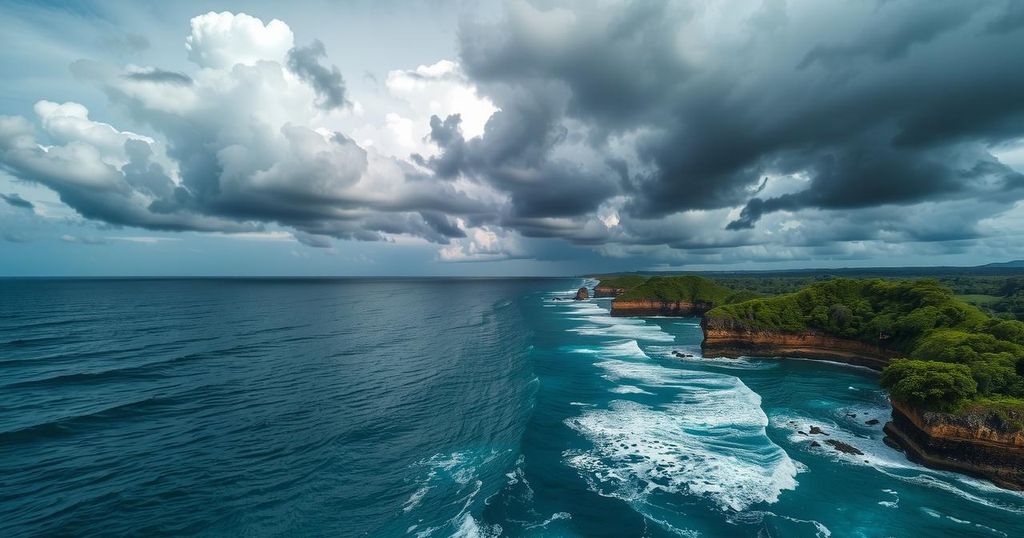Impact of Tropical Cyclones in the Southwestern Indian Ocean: 2024/2025 Season Overview

The publication details the destruction caused by Tropical Cyclones Chido and Dikeledi during the 2024/2025 cyclone season in Southeast Africa, impacting Madagascar, Mozambique, and Mayotte with many fatalities, widespread displacement, and significant infrastructure damage. The emergency stricken areas emphasize the need for continuous humanitarian efforts and preparedness in anticipation of further cyclones and flooding.
Tropical Cyclone Chido initiated the 2024/2025 cyclone season in the Southwestern Indian Ocean, causing devastating impacts particularly in Madagascar, Mozambique, and Mayotte. Chido intensified to Category 4 on December 11, 2024, leading to at least 172 fatalities and numerous injuries. The cyclone inflicted considerable damage on infrastructure, displacing over 135,800 individuals in Madagascar, with subsequent heavy rains exacerbating the disaster through flooding and crop damage.
Following Chido, the cyclone also significantly impacted the Comoros islands, with the government declaring a week of mourning as 64,167 people were affected. Damage included the destruction of numerous homes and schools, alongside the loss of 45 percent of crops. Mayotte experienced severe consequences as well, with approximately 70 percent of its population impacted, leading to substantial destruction of homes and essential facilities.
In Mozambique, an Initial Rapid Assessment revealed that approximately 90,640 households were affected, resulting in significant property destruction across multiple provinces. By December 30, 2024, it was reported that 32,379 homes sustained partial damage while 72,160 were completely destroyed, totaling 104,539 damaged shelters. Meanwhile, Malawi experienced similar devastation, with nearly 46,000 individuals affected by high winds and rain.
On January 11, 2025, Tropical Cyclone Dikeledi struck northern Madagascar, affecting over 7,000 people and damaging 1,000 homes. Despite school resumption on January 13, 8,000 children’s education was disrupted due to classroom destruction. Dikeledi continued to affect Mozambique on January 14, compounding the damages already inflicted by Chido, with preliminary assessments indicating further shelter damage.
In late February 2025, two additional systems, Tropical Storm Honde and Severe Tropical Storm Garance, emerged, causing further damage. Honde alone affected nearly 100,000 individuals in southern Madagascar, destroying more than 10,000 homes, while Garance disrupted utilities in La Réunion and prompted preparedness measures in Mauritius.
Intensifying flooding across Southeastern Africa, particularly impacting Madagascar, Malawi, and Mozambique, has escalated due to recent cyclones and heavy rainfall. In Madagascar, over 2,800 individuals were displaced due to flooding in February. Malawi saw extensive flooding affecting 40,178 households, with various districts reporting injuries and fatalities, while Mozambique faced rising river levels.
Despite the extensive emergency relief efforts, the recent cyclones emphasize the necessity for preparedness and resilience amid increasing cyclone frequency. The Emergency Appeal seeks to enhance the ability of the International Federation of Red Cross and Red Crescent Societies (IFRC) to deliver essential humanitarian assistance, bolster the readiness of responders, and strengthen at-risk communities in the wake of these disasters.
The 2024/2025 cyclone season has demonstrated the severe impacts of Tropical Cyclones Chido and Dikeledi in the Southwestern Indian Ocean, resulting in significant destruction and displacement in Madagascar, Mozambique, and Mayotte. The ongoing flooding crisis emphasizes the urgency for continued disaster management initiatives and support services. Preparedness efforts and community resilience remain critical as the cyclone season continues, highlighting the vital role of national societies and humanitarian networks in response efforts.
Original Source: reliefweb.int






